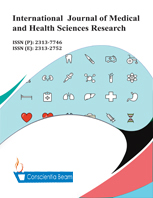Impact of Ramadan Fasting on Some Biochemical Aspects in Healthy Subjects
Abstract
Muslims are obligated to fasting during the day and restricting food and drinking amount for the period after the sunset during Ramadan. Modifications in the circadian distribution of the eating and sleeping schedule result in various changes in different biochemical parameters. In this study the effect of fasting on glucose, insulin, Cortisol, triglyceride, cholesterol, high density lipoprotein (HDL), low density lipoprotein (LDL), estradiol, testosterone, thyroid stimulating hormone (TSH), FT4 and FT3 during and post fasting was measured. Blood samples were taken from 26 adult male subjects during and post fasting. The results obtained showed a significant decrease in glucose and TSH levels, while the levels of insulin triglyceride, free thyroxine (FT4) and free triiodothyronine (FT3) showed a significant increase. This study showed that there are changes in dietary habits depending on cultural rituals, often practices during Ramadan, among Muslim societies. Consequently that may affect various components of metabolic importance.

